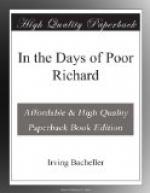Jack and Solomon attended the town meeting that day in the old South Meeting-House. It was a quiet and orderly crowd that listened to the speeches of Josiah Quincy, John Hancock and Samuel Adams, demanding calmly but firmly that the soldiers be forthwith removed from the city. The famous John Hancock cut a great figure in Boston those days. It is not surprising that Jack was impressed by his grandeur for he had entered the meeting-house in a scarlet velvet cap and a blue damask gown lined with velvet and strode to the platform with a dignity even above his garments. As he faced about the boy did not fail to notice and admire the white satin waistcoat and white silk stockings and red morocco slippers. Mr. Quincy made a statement which stuck like a bur in Jack Irons’ memory of that day and perhaps all the faster because he did not quite understand it. The speaker said: “The dragon’s teeth have been sown.”
The chairman asked if there was any citizen present who had been on the scene at or about the time of the shooting. Solomon Binkus arose and held up his hand and was asked to go to the minister’s room and confer with the committee.
Mr. John Adams called at the inn that evening and announced that he was to defend Captain Preston and would require the help of Jack and Solomon as witnesses. For that reason they were detained some days in Boston and released finally on the promise to return when their services were required.
They left Boston by stage and one evening in early April, traveling afoot, they saw the familiar boneheads around the pasture lands above Albany where the farmers had crowned their fence stakes with the skeleton heads of deer, moose, sheep and cattle in which birds had the habit of building their nests. It had been thawing for days, but the night had fallen clear and cold. They had stopped at the house of a settler some miles northeast of Albany to get a sled load of Solomon’s pelts which had been stretched and hung there. Weary of the brittle snow, they took to the river a mile or so above the little city, Solomon hauling his sled. Jack had put on the new skates which he had bought in Bennington where they had gone for a visit with old friends. They were out on the clear ice, far from either shore, when they heard an alarming peal of “river thunder”—a name which Binkus applied to a curious phenomenon often accompanied by great danger to those on the rotted roof of the Hudson. The hidden water had been swelling.
Suddenly it had made a rip in the great ice vault a mile long with a noise like the explosion of a barrel of powder. The rip ran north and south about mid-stream. They were on the west sheet and felt it waver and subside till it had found a bearing on the river surface.
“We must git off o’ here quick,” said Binkus. “She’s goin’ to break up.”
“Let me have the sled and as soon as I get going, you hop on,” said Jack.




